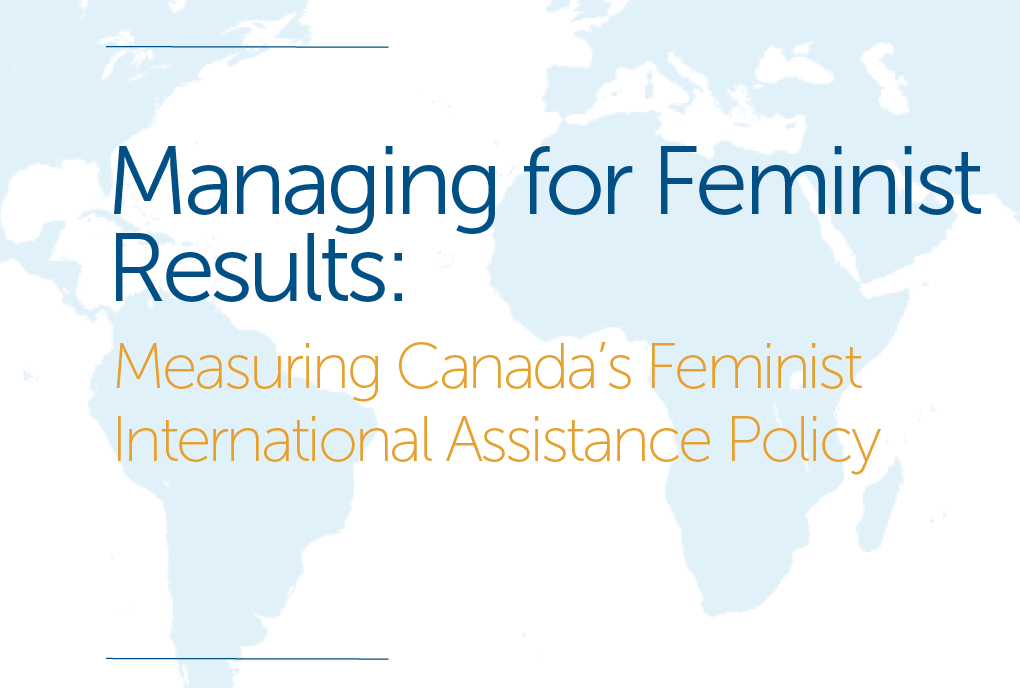DG White Paper Release: Managing for Feminist Results
Today, Development Gateway (DG) is pleased to announce the publication of the Managing for Feminist Results: Measuring Canada’s Feminist International Assistance Policy white paper, that outlines the challenges and opportunities that development agencies may face when adopting new and/or feminist policies.
Our last white paper discussed the need to change how we approach, design, and implement M&E systems, to achieve more effective results data use. In this white paper, we share a practical look at what that means in practice, highlighting our work with Global Affairs Canada – International Assistance (GAC-IA) and supporting development of its first-of-its-kind Feminist International Assistance Policy (FIAP).
Using our Custom Assessment and Landscape Methodology, we worked with GAC-IA to develop its FIAP M&E work plan, design a comprehensive FIAP M&E system to fit within its existing frameworks, and calculate pre-FIAP baseline values for all 26 indicators identified. Despite being a federal agency with over 6,000 employees, all of this was accomplished within one year of the FIAP being announced. The M&E system has been deployed to GAC-IA employees, and will be used to capture FIAP monitoring data during annual reporting. Additionally, as early as next year, the Year 1 results of GAC-IA programming under the FIAP are expected to be available for internal learning and planning.

Managing for Feminist Results: Measuring Canada’s Feminist International Assistance Policy
Building on the GAC-IA experience, the paper provides an overview of how other development agencies can integrate a feminist lens into their existing M&E frameworks. It also outlines how to adapt agency-wide reporting mechanisms to new policies quickly and comprehensively, following GAC-IA’s lead rolling out a new strategy with minimal disruption for program staff.
It’s also important to note what this paper does not do – it does not seek to evaluate or define GAC-IA’s definition of “women’s empowerment.” Challenges associated with measuring “women’s empowerment” and evaluating strategy effectiveness to achieve that empowerment is an ongoing conversation that GAC-IA hopes to contribute to.
With the FIAP in place and M&E systems already in use, GAC-IA is in a position to learn how to empower women and girls by doing. Through this learning by doing, the FIAP’s policy impact — and the empowerment of women and girls — can begin to be realized (and measured!) without delay.
Share This Post
Related from our library

Economic Toll of Tobacco-Related Diseases in Kenya: New Research Findings
Development Gateway: An IREX Venture (DG) is pleased to announce the publication of a research manuscript on the Economic Costs of Tobacco-Related Illnesses in Kenya. This research was carried out as part of the Tobacco Control Data Initiative (TCDI) activities in Kenya and is part of a broader report on Morbidity and Mortality from Tobacco Use in Kenya.

Building a Sustainable Cashew Sector in West Africa Through Data and Collaboration
Cashew-IN project came to an end in August 2024 after four years of working with government agencies, producers, traders, processors, and development partners in the five implementing countries to co-create an online tool aimed to inform, support, promote, and strengthen Africa’s cashew industry. This blog outlines some of the key project highlights, including some of the challenges we faced, lessons learned, success stories, and identified opportunities for a more competitive cashew sector in West Africa.

Digital Transformation for Public Value: Development Gateway’s Insights from Agriculture & Open Contracting
In today’s fast-evolving world, governments and public organizations are under more pressure than ever before to deliver efficient, transparent services that align with public expectations. In this blog, we delve into the key concepts behind digital transformation and how it can enhance public value by promoting transparency, informing policy, and supporting evidence-based decision-making.